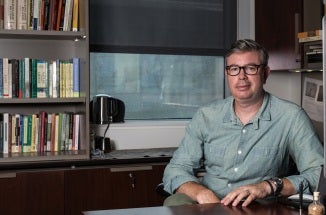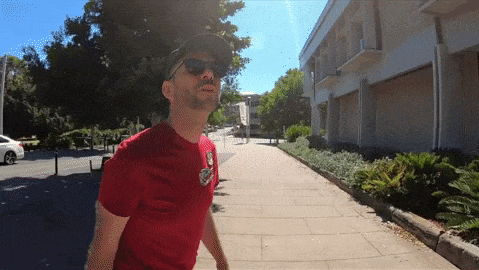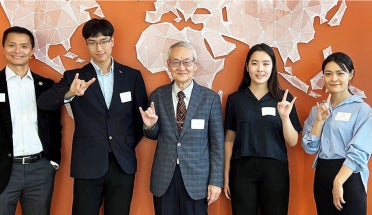
UT Students and Faculty Collaborate with Peers in Australia through Global Virtual Exchange
- Jul 30, 2020
- Global Initiatives
- by Jenan Taha
Collaborating with their peers across the globe, UT students and faculty are conducting international research and exchanging diverse perspectives with classrooms abroad as part of the Global Virtual Exchange program.
Texas Global recently awarded 17 virtual exchange grants to faculty from five colleges and schools across the university. One of these grant recipients was associate professor Jason Cons, who teaches Landscape and Power, a signature course exploring how our surrounding environment shapes social interactions.
Taught in partnership with University of Newcastle in Australia, his course has incorporated virtual exchange since spring 2020. With his latest award, Cons and his institutional partner abroad will expand upon their collaborations this upcoming academic year.
Cons developed the course with Newcastle professor Duncan McDuie-Ra to encourage students to look at the ordinary scenery around them in a new way to reveal details about the area’s demographics, politics, history and more. The course shifted to focus on COVID-19 after spring break, examining how their environment was impacted by COVID-19.
Cons said the online international exchange component of the course proved invaluable to his students’ work, allowing them to compare and contrast two environments in real-time—Austin and Newcastle—that are vastly different in some ways, but whose similarities have become more poignant as a result of the global health crisis.
“The ability to have a conversation with someone whose experiences differ is pretty unique in the context of contemporary education,” Cons said. “That’s the beauty of this virtual exchange—it gives people the opportunity to have these kinds of encounters and discussions which would be much harder to have otherwise. It forces them to think about the things they take for granted.”
One of the students’ early assignments was to complete a walking ethnography, observing and analyzing the details of a familiar area around them, which they later translated into photos and essays to discuss with their peers.

McDuie-Ra conducts a walking ethnography of Newcastle
The course was designed to help students better understand the world around them, so it only made sense for the class to involve discussions on COVID-19 after spring break, Cons said.
“In the context of COVID-19 and the new world in which we all find ourselves in, we hope that students bring the same intellectual curiosity to understanding this crisis as it unfolds,” Cons said. “By starting to think about this critically and taking charge of doing one's own analysis, it makes it a little bit easier to make sense of what's unfolding.”
Students in the course at UT and Newcastle studied how different factors like gender or race can affect how people view the pandemic and how it impacts various groups differently. Their final project considered how the pandemic shaped their environment with distinct inequalities.
“Everyone is experiencing something really similar even as it's unfolding in really different places,” Cons said. “What we're hoping students will largely be doing is reflecting on similarities and differences in a moment where everybody is effectively experiencing a fairly similar unfolding crisis. That will involve exchanging photos and setting up Zoom conversations with smaller groups of people.”
Philippe Groff, aerospace engineering freshman and international student, said he values the diverse perspectives and accessibility offered by Global Virtual Exchange.
“The virtual classroom has been a very enjoyable experience,” he said. “I believe international connections as a whole are very important. These new points of view can be applied anywhere and will give you an edge later on in life.”
Psychology freshman Abigail Flame says she enjoyed interacting and collaborating with Australian students throughout the course.
“It shows how even being in different continents there are similar ways to teach a class, even if it’s Austin versus Newcastle,” Flame said. “The virtual exchange component is very eye-opening; it broadens your educational views.”

Flame's landscape observation of Speedway
Cons said he plans to continue teaching the class alongside McDuie-Ra and hopes to expand the course to bring in colleagues from other institutions around the world.
Since 2017, Global Virtual Exchange at UT has connected students and faculty with top-tier international universities, utilizing digital technology to provide students with global learning experiences, encourage faculty collaboration and deepen the university’s institutional partnerships around the world.
To date, UT has offered over 20 courses reaching more than 500 UT students and their peers across six continents. An anticipated 1,200 students will benefit from the global virtual exchange model from fall 2020 to spring 2021.
The Global Virtual Exchange Initiative just closed a funding cycle for course implementation in fall 2020 or spring 2021. Texas Global will launch another funding cycle this fall with an October deadline. Faculty at UT Austin and those abroad who are interested in the program are encouraged to fill out a brief Global Virtual Exchange faculty survey.
Learn more about Global Virtual Exchange and contact globalvirtualexchange@austin.utexas.edu for more information.



